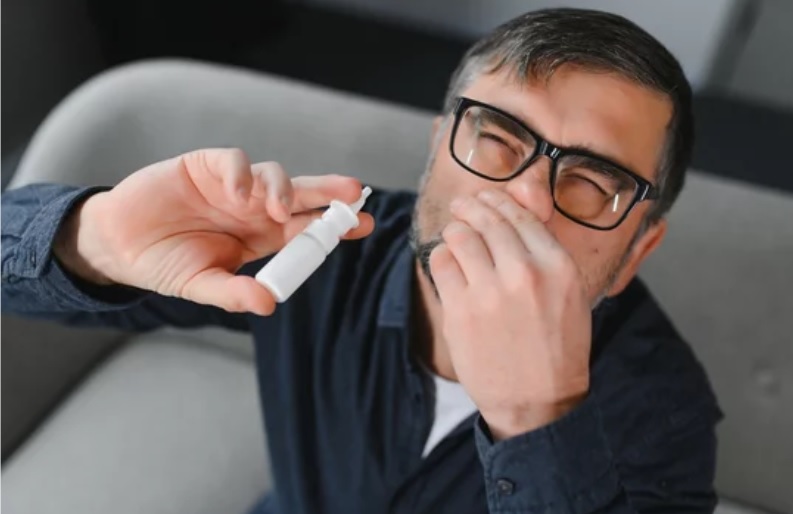Are you tired of constantly battling the symptoms of allergic rhinitis?
The sneezing, nasal itching, and nasal congestion can be incredibly frustrating to deal with on a regular basis.
While there are various treatment options available, one may wonder if there are any surgical interventions that can provide long-lasting relief.
In this article, we’ll explore the question: “Is there any surgical treatment for allergic rhinitis?”
Let’s find out!
Understanding Allergic Rhinitis
Before we delve into surgical options, let’s briefly understand what allergic rhinitis is.
Allergic rhinitis, which is commonly known as hay fever, is an allergic response to specific allergens such as pollen, dust mites, pet dander, or mold spores.
When these allergens enter your body, your immune system overreacts, releasing histamines and other chemicals that lead to the symptoms of allergic rhinitis.
Symptoms of Allergic Rhinitis
Allergic rhinitis can manifest in various ways, including:
Sneezing

Runny or stuffy nose

Itchy or watery eyes

Nasal congestion

Postnasal drip

Itchy throat or ears

These symptoms can significantly impact your daily life and overall well-being.
Non-Surgical Treatments for Allergic Rhinitis
Before considering surgical options, it’s important to explore non-surgical treatments for allergic rhinitis.
These treatments are often effective in managing symptoms and provide relief to a large number of individuals.
Common non-surgical approaches include:
(I) Medications
Medications are often the first line of treatment for allergic rhinitis. They can help alleviate symptoms and control the underlying immune response.
Some common medications include:
- Antihistamines: These medications block the effects of histamine, reducing symptoms like itching, sneezing, and runny nose.
- Nasal Corticosteroids: These nasal sprays reduce inflammation in the nasal passages, relieving congestion and other symptoms.
- Decongestants: Decongestants help shrink blood vessels in the nasal passages, reducing congestion. They are available in both oral and nasal spray forms.
(II) Allergen Avoidance
Avoiding allergens is a key aspect of managing allergic rhinitis.
While it may not be possible to completely eliminate exposure to allergens, taking certain precautions can help reduce symptoms.
Some strategies include:
- Dust mite control: Use allergen-proof bedding covers, wash bedding regularly in hot water, and minimize carpeting in your home.
- Pollen management: Keep windows closed during high-pollen seasons, use air purifiers, and shower after spending time outdoors.
(III) Immunotherapy
Immunotherapy, commonly known as ALLERGY SHOTS, is a long-term treatment option for allergic rhinitis.
It involves regular injections of small amounts of allergens to desensitize your immune system over time.
This can help reduce the severity of symptoms and provide long-term relief.
Surgical Options for Allergic Rhinitis
While non-surgical treatments are typically effective for managing allergic rhinitis, there are instances where surgical interventions may be considered.
However, it’s important to note that surgery is not a common or first-line treatment for allergic rhinitis, and it is usually reserved for specific cases that do not respond to other treatments. Let’s explore some of the surgical options available:
A) Turbinate Reduction
One surgical procedure that may be considered for allergic rhinitis is turbinate reduction.
The turbinates are structures inside the nose that help humidify and filter the air we breathe.
In cases where the turbinates are swollen and contribute to nasal congestion, reducing their size can improve airflow and alleviate symptoms.
B) Sinus Surgery
In some cases, chronic sinusitis may accompany allergic rhinitis.
Sinus surgery, such as functional endoscopic sinus surgery (FESS), can help improve sinus drainage and alleviate symptoms of both conditions.
However, sinus surgery is typically performed to address underlying sinus issues rather than treating allergic rhinitis directly.
C) Posterior Neurectomy
During posterior neurectomy, the surgeon identifies and targets specific nerves in the nasal passages that are responsible for transmitting the signals associated with the allergic response.
These nerves, known as the posterior nasal nerves, are selectively removed or disrupted using various techniques, such as chemical denervation or nerve freezing.
Exploring All Options
In conclusion, while there are non-surgical treatments available that are effective in managing allergic rhinitis, surgical options exist for specific cases that do not respond adequately to other treatments.
Surgical interventions such as turbinate reduction or sinus surgery may be considered in such instances, but they are NOT COMMON or first-line treatments for allergic rhinitis.
If you’re struggling with allergic rhinitis, it is important to consult with an ENT SPECIALIST who can evaluate your condition and provide personalized recommendations.
The ENT specialist will be able to guide you through the available treatment options and help you find the best approach to manage your symptoms and improve your quality of life.
Remember, every individual’s situation is unique, and what works for one person may not work for another.
By exploring all available options and working closely with your healthcare provider, you can find an effective treatment plan that suits your needs and brings you long-lasting relief from allergic rhinitis.
THANK YOU
MEDICAL ADVICE DISCLAIMER:
This blog, including information, content, references, and opinions, is for informational purposes only.
The Author does not provide any medical advice on this platform.
Viewing, accessing, or reading this blog does not establish any doctor-patient relationship.
The information provided in this blog does not replace the services and opinions of a qualified medical professional who examines you and then prescribes medicines.
If you have any questions of a medical nature, please refer to your doctor or qualified medical personnel for evaluation and management at a clinic/hospital near you.
The content provided in this blog represents the Author’s own interpretation of research articles.
